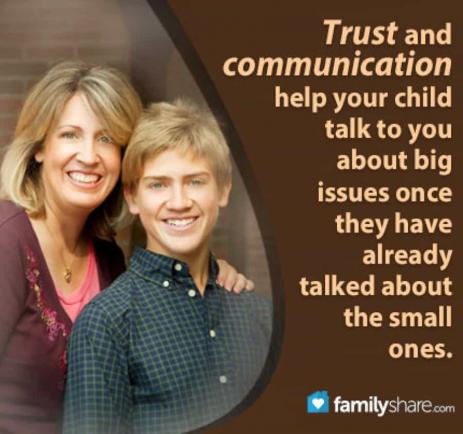
Communication is the most important aspect necessary to create a good relationship with your teen. What do you do when your teen is the one that won't participate? Here are three suggestions that just might help:
Create opportunities for conversations
While you may feel that you are always available for your child, your child may not get that impression. Sometimes, getting your teen to talk and share more with you could be as simple as scheduling time for them. Pick a comfortable space at home, or take them out for ice cream where you can devote your undivided attention to them and see what differences occur. Many times, a child will be more willing to open up and share their thoughts and feelings when they know they won't get interrupted by another sibling, the telephone, or other distractions.
Ask open ended instead of simple answer questions
Beginning a conversation with your child might seem uncomfortable or awkward, but the more times you do it, the easier it will become. If you are unsure or worried about forgetting questions you've thought of, write them down. This will make it easier for you. Be careful. Just because you have a list doesn't mean you have to get through the entire list. This can simply become a jumping off point for the conversation. If your teen opens up, follow their lead and let the conversation take its natural course instead of continually directing it back to your questions. Be sure that the questions you are asking are open ended. For instance, instead of asking about their day, you can ask what was the best part of your day. This will encourage your child to relay an event that happened during the day and can then build into a much lengthier conversation.
Become a better listener and allow your child to open or lead the conversation
You are the best model for your child on how to act during a conversation. If you are distracted and not listening he/she will learn that and be less attentive, as well. If you set the example of sharing thoughts and feelings—so will your child. Also, be aware of body language and how it can help engage your child. The more you can show your child that you are intently involved and listening to the conversation the more comfortable they will be in opening up to you. One very important part of this non-verbal communication is eye contact; you should feel comfortable and engaged enough to look your child in the eyes as they are speaking to you.
If you are just beginning these communication skills with your child it may take time to build up that important relationship and trust, but the more you engage the easier it will become. It is worth your time and investment to create an open relationship of communication with your teen. When you have trust and communication, your child will feel more willing to talk to you about the big issues because they have already talked to you about the small ones.

